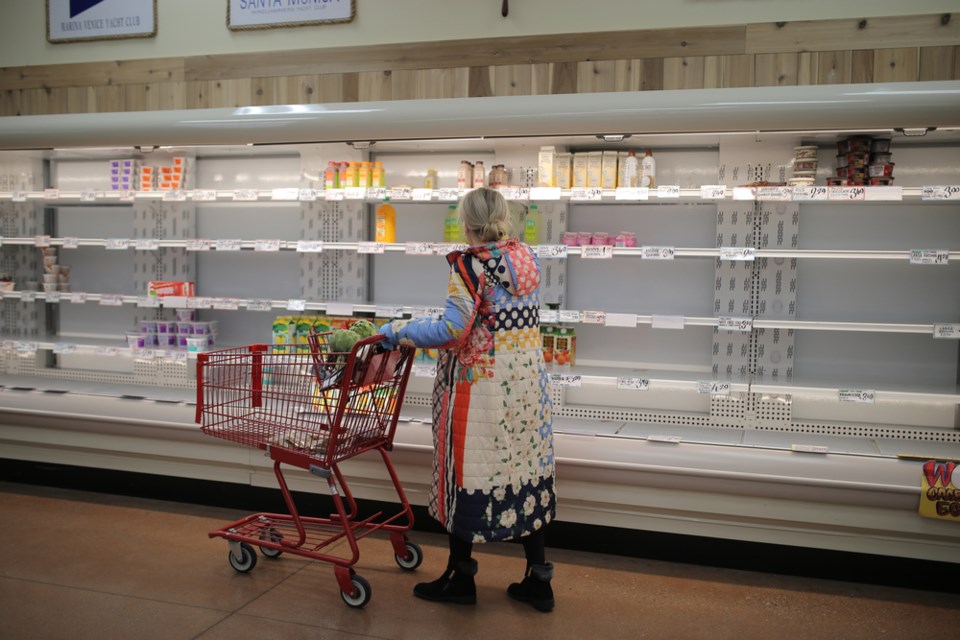If you’ve been to the grocery store lately, you might have noticed one or two changes. For example, patrons of Mitsuwa Marketplace may have realized that one hour before opening to the public on Saturdays, they are reserving shopping hours for customers over 60 years old and expecting mothers. U.S. chains like Kroger and Walmart now are shortening hours. They want to give employees time to restock and disinfect at the end of each day. Many are offering special hours only for customers who are at higher risk of COVID-19, like seniors, expecting mothers, and those with underlying health conditions.
Some are offering online specials and online shopping to encourage patrons to spend as little time as possible actually in the store. Many are having to put limits on items that are in high demand like toilet paper and hand sanitizer. According to a very nice cashier at my local Market Street, they currently have plenty of toilet paper because there is a one-per-customer limit on multi-packs of toilet paper and four-per-customer limit on single rolls.
They are, however, out of hand sanitizer and won’t have more for months.
In the days of COVID-19, grocery shopping has to be done with care. The CDC has said that COVID-19 is spread person to person, through “respiratory droplets produced when an infected person coughs or sneezes.” While they don’t recommend wearing a mask to the store, there are several ways to take precautions and flatten the curve.
With experts recommending social distancing, frequent hand washing (for 20 seconds) and regularly sanitizing “high-touch areas” such as door knobs, handles and keyboards, the rules of safe engagement with the outside world have changed. Here are just a few of them.
Respect Special Hours
A week ago, Plano’s Market Street was criticized on Facebook because their new special shopping hours, reserved for those who are at high risk for COVID-19, were packed. While many stores country-wide are offering special shopping hours that are meant to be reserved for those who are at high risk for COVID-19, their hands are tied when it comes to actually policing members of the communities shopping in their stores. Short of catching every customer at the door and demanding a doctor’s note to prove they are vulnerable to COVID-19, stores who post reserved hours for those customers need the community’s help to provide that service. It’s up to the community to act in good faith, make a note of special reserved hours, and save their shopping for another time.
Basic Handwashing
Thankfully, regarding COVID-19 transmission through food and food packaging, the risk is low. The biggest risk when it comes to grocery shopping is the handles of shopping carts and baskets. Experts suggest that you avoid touching your face while shopping, and to wash your hands afterward. For example, Trader Joe’s has antibacterial wipes available next to the door.
Cleaning Produce
More good news: perishables do not need to be disinfected prior to use. Safely preparing produce shouldn’t require anything more than what is typically recommended, a thorough rinse and a turn in the salad spinner.
Clean Reusable Grocery Bags
Even though reusable grocery bags are usually a great idea, being much more environmentally responsible, they are considered high-touch items and need to be cleaned regularly. If they can’t be machine washed, wiping it down with a proper sanitizer containing at least 60 percent alcohol is a good idea. The CDC says the virus can live “for hours to days on surfaces made from a variety of materials.”
Delivered Groceries
There’s usually an upcharge, and even though I’m partial to picking my produce, if there’s ever a time for contactless delivery, now is the time, especially if you’re high risk or if you’re exhibiting symptoms. If you are exhibiting symptoms, wake until the delivery person leaves before picking up your items.
Make the Right Grocery List
The Academy of Nutrition and Dietetics recommends keeping several items stocked in the pantry. The best way to limit the amount of times you need to visit the store is to have a well stocked pantry with dried or canned beans, canned vegetables and fruit, grains like rice, quinoa, and pasta, nut butters, herbs, and vegetable oils. A frozen pizza isn’t a bad idea either.




